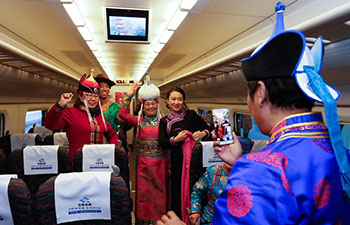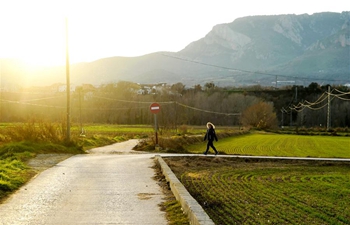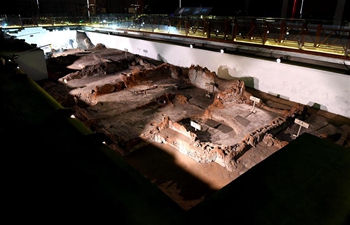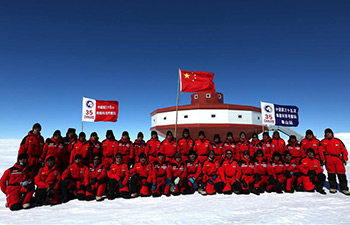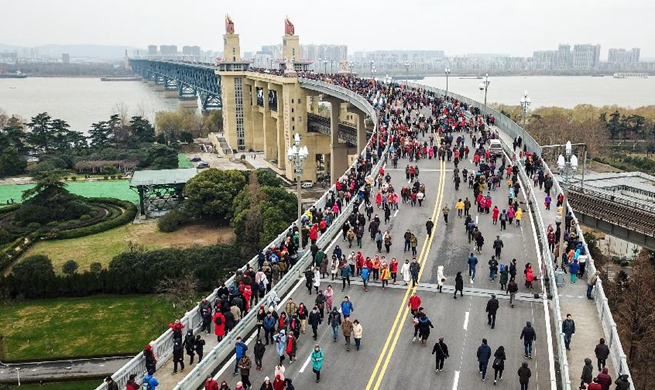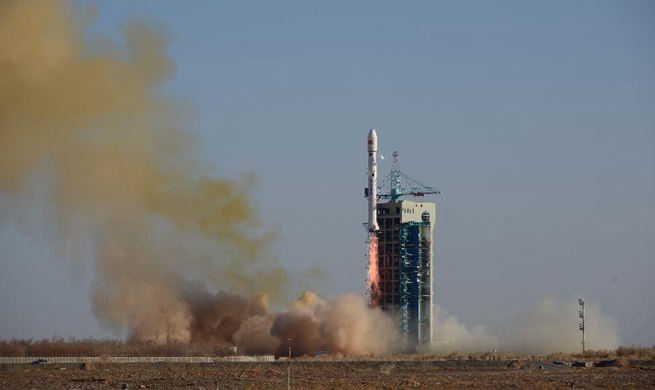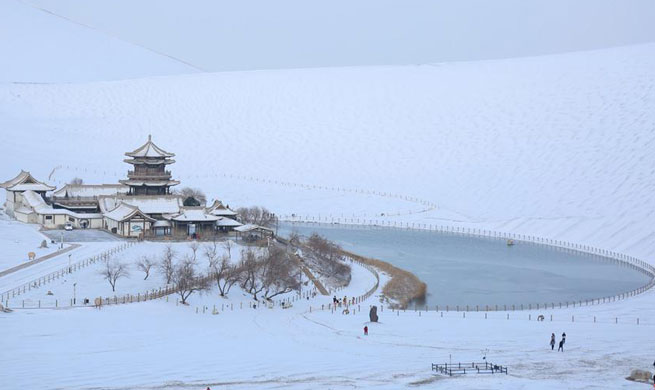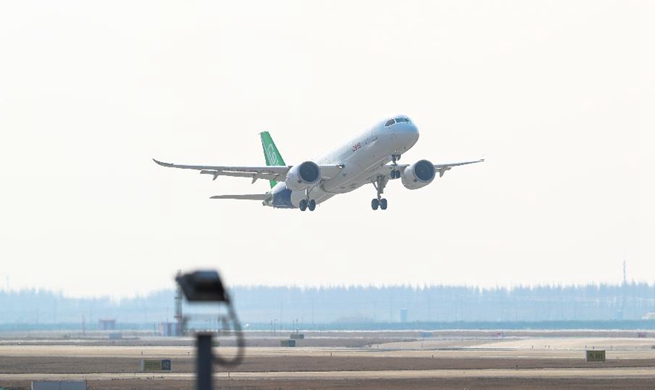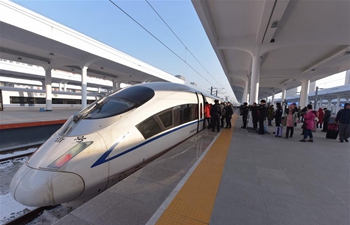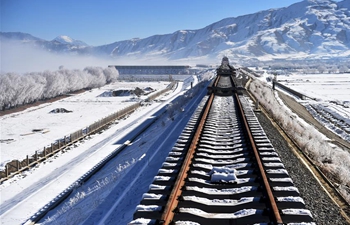by Hummam Sheikh Ali
DAMASCUS, Dec. 29 (Xinhua) -- The year 2018 has witnessed a series of key events in war-torn Syria, which led to recent indications that the country is on track to restore relations with its Arab neighbors as the war looks set to wind down in 2019, especially after the United States decided in December to withdraw all its troops from Syria.
MILITARY VICTORIES IN SUCCESSION
With the help of its Russian ally and the pro-government forces, the Syrian army has achieved a succession of military victories that further consolidated its grip in the country.
In May, the army secured the entire vicinity of the capital Damascus, capturing the sprawling Eastern Ghouta countryside which was the main bastion of the rebels in eastern Damascus and an immense threat to the capital.
Later in the month, the army defeated the Islamic State (IS) militants in southern Damascus, mainly in the Yarmouk Camp area, further expanding the safety ring around the capital.
Also in May, the last batch of rebels left the Syrian central city of Homs, a hub city that connects southern areas, including the capital, with northern areas and has oil and gas fields in its countryside.
In July, the army secured Quneitra Province in southern Syria near the Israeli-occupied Golan Heights, a month before it stripped the rebels of the birthplace of the Syrian war: Daraa Province near the Jordanian border.
Meanwhile, the Syrian government secured the entire borderline with Jordan, and officially re-opened the Nasib Border Crossing, one of the most important land crossings in the region which allows the flow of goods from Lebanon to Jordan and further to the Gulf states.
In addition, large swathes of territories on the Syrian-Iraqi border were also recaptured by the Syrian army.
With the military victories by the government, the Syrian refugees in Lebanon and Jordan have also started returning over the past few months to their villages and towns retaken by the army.
DE-ESCALATION ZONE IN IDLIB
Russia, main ally of the Syrian government, and Turkey, which backs the rebels, reached a deal in September to create a de-escalation zone in and around the northwestern province of Idlib, the last major rebel stronghold in Syria.
The de-escalation deal, also covering the northern countryside of Hama Province and the northeastern countryside of Latakia Province, has restored relative calm in these areas despite sporadic violations.
However, the Syrian government has made it clear that its ultimate goal is to regain control of Idlib from the ultra-radical rebel groups.
In addition, the government said the areas controlled by the U.S.-backed Kurdish militia in northern and northeastern Syria will be put back on the agenda after the Idlib issue is solved.
REBOOTING DIPLOMATIC ENGAGEMENT
The re-capture of key areas has put the Syrian government in a better position to buckle up on the diplomatic levels.
On Nov. 18, Syrian Deputy Foreign Minister Faisal Mekdad was cited by the pro-government al-Watan newspaper as saying the government welcomes any step conducive to the return of Arab embassies to the capital Damascus.
"We welcome any step that could help in returning the embassies of Arab countries to work in Syria," said Mekdad.
On Thursday afternoon, the United Arab Emirates (UAE) officially reopened its embassy in Syria after six years of closure, marking the first state of the Gulf Cooperation Council (GCC) to resume diplomatic work in the war-torn country.
On Dec. 16, Sudanese President Omar al-Bashir paid a hours-long visit to Damascus, the first Arab leader to do so since the Syrian crisis erupted in 2011, apparently marking a prelude to the restoration of normal Arab relations with Syria, and even its return to the Arab League.
During his brief yet significant visit, the Sudanese president highlighted his country's support to Syria, saying Sudan is ready to provide whatever needed to support the territorial integrity and unity of Syria.
For his part, Syrian President Bashar al-Assad said al-Bashir's visit will give a strong push toward restoring the bilateral relations to what they were before the war.
According to al-Watan newspaper, Iraqi President Barham Salih will visit Syria soon to discuss the reopening of the border between the two countries.
On Monday, al-Watan said Ali Mamlouk, chief of Syrian security services, visited Egypt over the weekend upon an official invitation of the Egyptian intelligence chief Abbas Kamel and held talks with Egyptian officials in Cairo.
On Nov. 19, a delegation of Jordanian parliamentarians visited Syria in an attempt to break the ice between the two governments for years.
The more positive Arab attitudes toward Syria come against the division in the Arab world over the Syrian civil war as some countries side with the government while others, such as the Gulf states, openly support the insurgency.
Bassam Abu Abdallah, director of the Center for Strategic Studies at Damascus University, told Xinhua that these diplomatic visits are all indications of detente in 2019, and even the rhetoric of Saudi Arabia on Syria has become less sharp.
U.S. DECISION TO EXIT SYRIA
However, the most significant development in Syria in 2018 is the U.S. abrupt decision in December to withdraw all its troops from Syria, as long demanded by the government of President al-Assad.
The U.S. forces stepped in the Syrian war in 2014, first supporting some rebel groups before ending up backing the Kurdish militia in northern Syria in its fight against the IS.
In a recent phone call with his Turkish counterpart Recep Tayyip Erdogan, U.S. President Donald Trump reportedly said the withdrawal of the U.S. forces from Syria will be slow and coordinated.
The ongoing U.S. withdrawal will apparently leave the Kurdish militants in northern Syria with only two choices, either to confront the planned Turkish military campaign or to return under the umbrella of the Syrian government.
The latter one seems to be a better bet as the Syrian army declared on Friday that it had entered Manbij, a key northern city which lies about 30km south of the Turkish border, at the invitation of the Kurdish People's Protection Units (YPG) which had withdrawn from the city.
Muhannad Haj Ali, a Syrian lawmaker, described the U.S. presence in Syria as "an act of aggression," saying its withdrawal would help the political process in Syria.
"The withdrawal comes as part of a Russian pressure on the United States to pull out in order to accelerate the Syrian political process and find a peaceful solution to the Syrian crisis," he told Xinhua. Enditem




